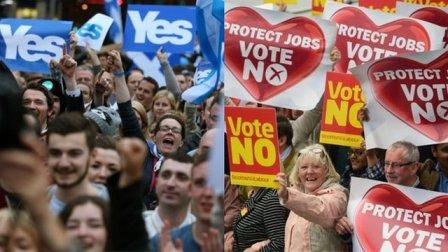1st October 2014
Scotland The Wise
Three weeks ago the Economist’s front cover pictured a drooping Union Jack with the headline: UK RIP? Fortunately the dismemberment of the United Kingdom didn’t happen. Scots voted by a 10% margin to retain the union. But it was a close run thing.

If the campaign for independence had been successful, the impact of Scotland becoming a separate state would have been dramatic. The remaining union of England, Wales and Northern Ireland would have been a much weaker entity, politically, socially and economically.
That a proud nation with a long history of successful union can come so close to disintegration surprised and alarmed many people round the world. Looking back at the debate, there were some significant themes that resonated in other countries. These themes perhaps offer useful lessons for others.
The first is that democracy is a good thing. The Scots indulged in an open, vigorous and often passionate debate about the future of their country. It was a debate about policy: what sort of Scotland did they want? Would the future be better as an independent country? What are the pros and cons of the big choice?
Major campaign groups were formed on both sides of the argument. And spontaneous groups set themselves up on buses, in pubs and office canteens to talk politics: how did they want to be governed? What sort of taxation, education and health systems did they want?
This was not just a case of the politicians talking to the people. This was freedom of expression at its best: the people persuading the politicians. The debate often divided communities, friends and even families.
Despite the passion, the campaign was almost entirely peaceful. Maybe an egg thrown here or a scuffle there. But people generally respected the views of the opposing side and did not resort to threats or intimidation. And now Scots are accepting the decision of the majority. With a 84.5% turnout, the people have spoken and democracy is the winner.

Secondly, political reform is an on-going process and is probably never-ending. In England, political change started with the Magna Carta in 1215 which began to shift power from the monarchy to the feudal barons. England and Scotland began to share the same monarch in 1603 and the union was cemented in 1707.
Now that the referendum is over, there will be a new process of transferring new powers to the Scottish Parliament and Government who already control health, education, justice, rural affairs, housing and the environment. This move will in turn lead to fundamental constitutional reform as the country engages in the debate about transferring similar powers to the other parts of the United Kingdom.
Thirdly, it shows that questions of identity remain crucially important to people, not just in Scotland but in many parts of the world. Nationalism is a very potent force which can be used to mobilise people. In some parts of the world, ethnicity is used to instil hatred of other people, whether it is an oppressor or a competing group who are seeking either political or economic advantage. In others it has led to ethnic cleansing, massacres and genocide.
If identity is used to breed prejudice, suspicion and mistrust, it can lead to lasting and even permanent division. Such separation might not be to everyone’s benefit, but once the genie is out of the bottle, it can sometimes be impossible to put it back.
In the end, unity is best. Such unity requires tolerance, magnanimity and generosity to others, feelings that might not come naturally. But as the campaign that fought against independence in Scotland argued, we are Better Together.
One of Scotland’s most stirring patriotic songs is “Scotland The Brave”. On this occasion wisdom prevailed. I am glad that this Embassy will continue to represent Scotland The Wise.
CORRECTION
Dear Peter ,
pls. allow to correct 1 import fact /name iin. re of my comment.
For correct is of course : MadriD vs. Barcelona.
Nevertheless : I ‘m quite curious of how the referendum ‘s result next November !
Best wishes, liebe Grüßle, Ingo-Steven
Unity is definitely best. We need more of that and less hate.
“In some parts of the world, ethnicity is used to instil hatred of other people”
Most weeks in the UK, thanks to the Daily Mail and others! Why it is OK to peddle hate I am not quite sure.
Interesting Point of view on this topic
Dear Peter ,
after I ´ve read yr. report twice there are 2 points of which I do full agree to you .
#1 : “democracy is a good thing”.
#2 : “in the end , unity is best.”
But what I´ve missed is the fact that more & more people ´cross the world DON ´T wanna further independence from their nations. Maybe FOR their local areas. I.e.: former North – & south Yemen. Province Quebec & Canada. Ukrainians who fight against Russian seperation of the East. S-Korean who want a reunion with the North.Falklanders who wants to stay British. And surely we Germans who fought peaceful for a reunion. Well Peter, what are the intensions of the minority of the Scottish ? Religion ? Oil & gas? Nationalism ? To conclude : I don ´t know the backgrounds so well. But the Scottish majority was wise by voting “NO”!
By the way : it will be interesting to observe the situatation in Spain ´till November. Madris vs. Barcelona. Must be interesting of how Catalonia is voting.
Best wishes & take of yourself , liebe Grüßle & gib acht auf Dich,
Ingo-Steven , Stuttgart
Well. Let us hope for the best in life.